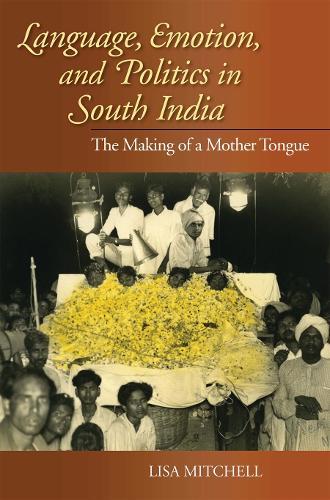Awards
- Winner of Edward Cameron Dimock, Jr., Prize in the Indian Humanities, American Institute of Indian Studies.
- Winner of Edward Cameron Dimock, Jr., Prize in the Indian Humanities, American Institute of Indian Studies.
- Winner of Edward Cameron Dimock, Jr., Prize in the Indian Humanities, American Institute of IndianStudies.
Overview
What makes someone willing to die, not for a nation, but for a language? In the mid-20th century, southern India saw a wave of dramatic suicides in the name of language. Lisa Mitchell traces the colonial-era changes in knowledge and practice linked to the Telugu language that lay behind some of these events. As identities based on language came to appear natural, the road was paved for the political reorganization of the Indian state along linguistic lines after independence.
Full Product Details
Author: Lisa Mitchell
Publisher: Indiana University Press
Imprint: Indiana University Press
Dimensions:
Width: 15.60cm
, Height: 2.00cm
, Length: 23.50cm
Weight: 0.476kg
ISBN: 9780253220691
ISBN 10: 0253220696
Pages: 304
Publication Date: 18 March 2009
Audience:
General/trade
,
General
Format: Paperback
Publisher's Status: Active
Availability: Out of stock

The supplier is temporarily out of stock of this item. It will be ordered for you on backorder and shipped when it becomes available.
Reviews
[O]riginal and persuasive... This lucid and engaging work will appeal to South Asianists as well as to other scholars interested in the history of language and literacy. -Mary Hancock, University of California, Santa Barbara, American Historical Review, Dec. 2009 [M]akes a brilliant intervention in the study of language and modernity by critically interrogating the concept of the 'mother tongue'... brims with interesting and provocative ideas that extend beyond its immediate focus...a fascinating and ambitious project. -Amanda Weidman, Bryn Mawr College, Anthropological Quarterly, Vol. 82, No. 4, 2009 Written with great zest and clarity, this book deepens our understanding of the complex relationships among linguistic identity, state formation, and individual political participation in South India. -Martha Ann Selby, University of Texas An exceptionally provocative work, unparalleled and unprecedented, that will certainly exert a profound impact on many areas of scholarship-even, I believe, outside of the area of Indian studies... A wide-ranging and exhilarating intellectual roller-coaster ride. -Phillip B. Wagoner, Wesleyan University There has been an explosion of recent studies of the regional cultures of South Asia built around its major modern languages. Lisa Mitchell's book is an outstanding addition to this fine list. The emergence of modern Telugu, its geographic imagination and its political aspirations, fulfilled at the cost of the self-sacrifice of martyrs, are brilliantly narrated and analyzed in this superb study. Mitchell's prose is crisp and precise, her reasoning is historically informed and theoretically sophisticated, and her ethnography is both sensitive and astute. This book is informative, thought-provoking and a pleasure to read. -Partha Chatterjee, Professor of Anthropology, Columbia University and Professor of Political Science, Centre for Studies in Social Sciences, Calcutta The study subtly identies links that all too often appear lost in the haze of un-critical activism. For that reason, along with its readable and forceful prose, this book makes a lasting contribution to knowledge and offers a valuable addition to any reading list on modern South Asian history. -South Asia Research Mitchell's study successfully demonstrates that 'The story of colonial encounters with language in Southern India includes the story of efforts to bring very different sensibilities regarding language into a single frame of discourse'. While colonial restructuring of language contributed significantly to the making of the mother tongues, the fact remains that the resurgence of regional languages and the demand for linguistic states in South India served a powerful impulse-cultural unification and political empowerment of people scattered among arbitrary administrative divisions. -Journal of Asian Studies The aim of 'Language, Emotion, and Politics in South India' is to show how the specific history of Telugu-language politics can shed new light on general questions of importance to researchers in a variety of fields who are concerned to understand the processes that have led speakers of particular languages to see themselves as having a separate history, literature, politics, and identity ... [An] ambitious and creative work. -Cultural Anthropology - AAA
Written with great zest and clarity, this book deepens our understanding of the complex relationships among linguistic identity, state formation, and individual political participation in South India. Martha Ann Selby, University of Texas An exceptionally provocative work, unparalleled and unprecedented, that will certainly exert a profound impact on many areas of scholarship - even, I believe, outside of the area of Indian studies... A wide-ranging and exhilarating intellectual roller-coaster ride. Phillip B. Wagoner, Wesleyan University
Author Information
Lisa Mitchell is Assistant Professor of Anthropology and History in the Department of South Asia Studies at the University of Pennsylvania.




